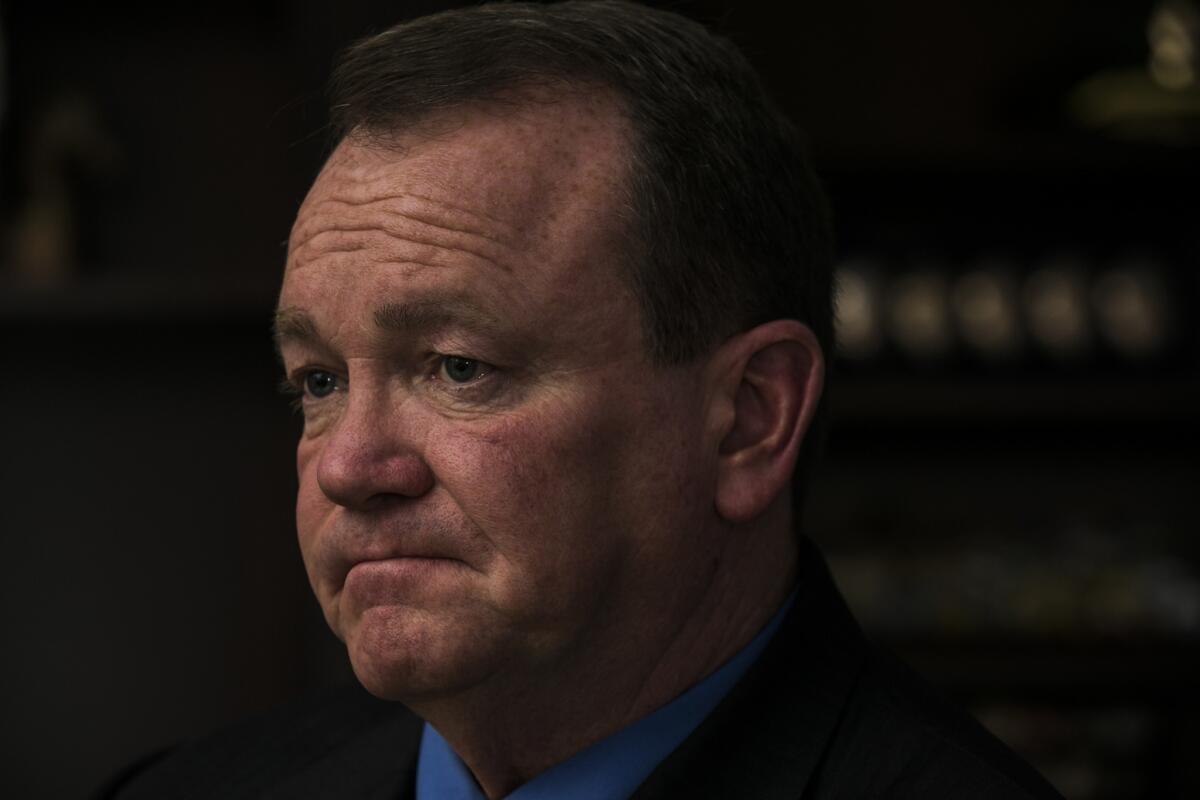Tentative agreement reached on inspector general access to sheriff’s department records

A tentative L.A. County agreement allowing the inspector general new access to Sheriff’s Department records comes as advocates have been ramping up pressure on the supervisors to finish setting up a civilian oversight commission for the department. Above, Sheriff Jim McDonnell.
Los Angeles County supervisors are expected to vote next week to approve an agreement that will give a watchdog over the Sheriff’s Department new access to records of investigations into deputy-involved shootings and other internal issues.
The tentative agreement comes as advocates have been ramping up pressure on the supervisors to finish setting up a civilian oversight commission for the Sheriff’s Department.
The department has been the subject of allegations of widespread abuses in the jails over the last few years, culminating in federal criminal charges against multiple deputies and former top officials, including retired Undersheriff Paul Tanaka.
The board voted a year ago to create a civilian commission to oversee the department, but has not finished hashing out the details of how it will be structured and who will serve on it.
In the meantime, Inspector General Max Huntsman has complained that he had not been getting access to some records needed to complete investigations, including records of internal investigations into use-of-force incidents.
The proposed agreement, which will give Huntsman that access with some restrictions, was released Wednesday.
Supervisors Mark Ridley-Thomas and Sheila Kuehl asked that the board vote next week to authorize Huntsman to sign the pact.
In an interview, Ridley-Thomas called the agreement “an important step forward in the process to bring about major reform for the Los Angeles County Sheriff’s Department.”
Under the proposed agreement, the inspector general will have “reasonable access to sheriff’s personnel records upon request, including individually identifiable peace officer personnel records,” with the caveat that the inspector general will limit the requests to “only those records and that portion of the record deemed necessary to [his] purpose.”
The inspector general and his staff will be allowed to view those records only on a secured computer terminal at a Sheriff’s Department facility and will not be allowed to take copies of them.
The agreement will also give the watchdog office copies of internal department investigations of deputy-involved shootings at the same time they are referred to the district attorney’s office, unless prosecutors object.
The inspector general will be able to use the information to produce public reports. But the reports cannot contain confidential information, including the names of deputies who are investigated or disciplined.
Huntsman described the agreement as a roadmap for access rather than a legally binding document. Under state law, he said, he should have access to the records.
“But we don’t want to have a legal battle over whether we’re going to have access -- we want the sheriff to give us access, and if he signs the [agreement], that’s what he’s doing,” he said.
Sheriff Jim McDonnell could not be immediately reached for comment.
McDonnell took office a year ago after running on a reform platform and has said he supports civilian oversight. But hashing out the details has proved difficult.
For instance, advocates want the new commission to have the power to subpoena records, but McDonnell has resisted that. They have also been divided over whether former sheriff’s officials should be barred from serving on the panel.
Advocates protested the slow pace of progress on civilian oversight.
“Many of us have loved ones inside the county jails,” said Mark-Anthony Johnson, an organizer with the group Dignity and Power Now. “A year later, our loved ones are still in these conditions,” including being threatened with retaliation for making complaints, he said.
Ridley-Thomas said the supervisors will take up the final steps toward setting up a civilian commission next month.
“I’d say they have a lot to be proud of in terms of the work they have done to help us get to the point where we are,” he said of the advocates who have criticized delays in the process. “This has been a lot of work, and we are arriving at a point to get it done and now [that] we have a board majority that is committed to it, it will get done.”
Twitter: @sewella
More to Read
Sign up for Essential California
The most important California stories and recommendations in your inbox every morning.
You may occasionally receive promotional content from the Los Angeles Times.











